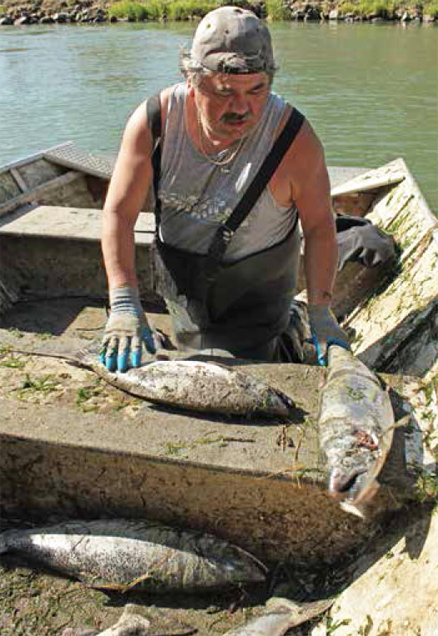Nisqually Tribe uses tangle nets, beach seines to reduce impact on chinook

Benji Kautz, Nisqually Tribe, unloads chinook during the tribe’s fishery last fall.
E. O’Connell, Northwest Indian Fisheries Commission
Treaty Indian tribes in western Washington are experimenting with fishing methods that help conserve depressed salmon
and steelhead stocks. The Nisqually Tribe began using alternative gear a few years ago, and this spring, the Lummi Nation and Upper Skagit Indian Tribe both held tangle net fisheries. Tangle nets are similar to gillnets, but have a smaller mesh size.
The Nisqually Indian Tribe will continue to lower impacts on returning chinook salmon this year.
“To make good on our recent gains in habitat restoration in the Nisqually, fishermen need to decrease how many natural origin chinook are caught,” said David Troutt, natural resources director for the tribe.
In recent years, the tribe has implemented drastic changes to its fishing regime, including a decrease of 15 fishing days since 2004; reducing the number of nets that can be used by a fisherman from three to two; and having just less than a month of mark-selective fishing with tangle nets and beach seines.
This year’s fishing plan will continue implementing mark-selective fishing, but only with beach seines.
“A historically large run of pink salmon is forecast to come in alongside chinook and coho this year,” Troutt said. Tangle
nets – which ensnare fish by their teeth – would catch an un- usually high number of pinks, which tribal fishermen aren’t targeting.
“Since 2004, Nisqually tribal fishermen have already cut hundreds of hours off their chinook season,” Troutt said. “Tribal fishermen are bearing the brunt of conservation for these fish so we can help them recover.”
In a mark-selective fishery, fishermen release natural origin fish that haven’t had their adipose fin removed in a hatchery. The adipose fin is a soft, fleshy fin found on the back behind the dorsal fin. Its removal does not affect the salmon.
“Mark-selective fisheries are a useful tool and the Nisqually is a unique place in western Washington where it could benefit salmon and tribal fisheries,” Troutt said.
